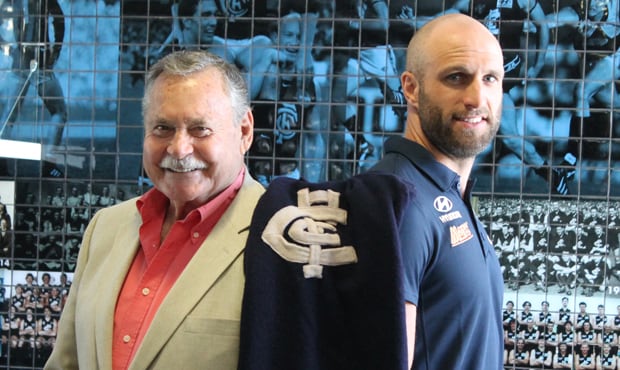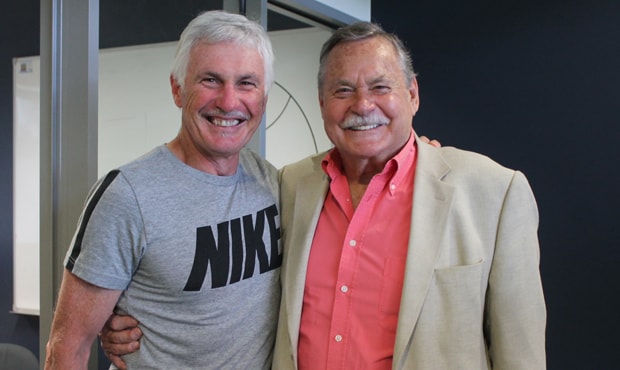Today, on the 50th anniversary of the deal that shook football to its very foundations, carltonfc.com.au brings you this excerpt from 'Out of the Blue', where the great Ron Barassi details his move to Carlton in his own words:
“I received a phone call from a fellow who would become a member of what I later learned to be the new Carlton committee, because there was going to be quite a stoush at the ballot boxes for the members. So I met a couple of guys [Graham Emanuel and Kevin McEncroe], had lunch at a very nice restaurant near the corner of Exhibition and Lonsdale Streets, a favourite haunt of one of the fellows, and I came away from there with what they had in mind from the point of view of the offer.
I got back to work at about half past two or three o’clock I suppose, and I then rang Jim Cardwell the CEO, or secretary in those days, of the Melbourne Football Club, and said to him, ‘Jim, this is what’s happened’. I’ve told Carlton I’ll consider it for a couple of days and say ‘No’ or ‘Let’s talk further’. I told him ‘I think it’s the right thing to do, to tell Melbourne via you’. I didn’t ring the coach, Norm Smith, because I thought it was more of a secretary’s thing, and whether I’m right or wrong on that is irrelevant. Anyway, that all happened on a Thursday.
In those days there was a first edition of The Herald which came out just before noon. And on the Friday morning I got a call from Alf Brown, the doyen of football writers at that time, and he said: “Ron, I believe this has happened – is this so?” He reeled off the circumstances of the Carlton situation, and the figures, and I’ve gone ‘Gee, I thought this was supposed to be confidential’. He then said ‘Ron, what are you going to do?’ and I said ‘Alf, I’ll ring you back in half an hour with my answer’.

Fifty years after he signed with Carlton, the great Ron Barassi poses with his original guernsey and Chris Judd. (Photo: Carlton Football Club)
I rang Jim Cardwell and said ‘Jim, did you bloody tell Alf Brown?’. ‘No’ came the reply, and I don’t know to this day whether he did or not, so I took it as ‘No’. So I then took it to be one of the Carlton guys. So I rang one and he was out, so I rang the other guy, Graham Emanuel I think it was, and said ‘If this is the way you’re going to run a football club, well forget it’. And that was it.
I then rang Alf, and by Friday it was in the news.
On the Sunday the Melbourne Football Club held a Christmas party down at the MCG for the kids, and I went down there with my wife and the kids. And Norm Smith said ‘Ah, writing your own stuff these days’ … you know, a bit of a dig. Other committeemen were giving me dirty looks and I thought ‘Gee, I’ve just knocked back a fantastic offer, chance or whatever you want to call it’ and I got really steamed up. So on my way home I said to my wife, ‘I think I’ll ring Alf Brown to see if this can be regurgitated and I can get the thing going again’. And the rest is history.
I probably drove Carlton mad, but it had nothing to do with money. I just found it extremely hard to leave my Melbourne. I certainly couldn’t have done it just as a player – the coach thing attracted me. And it was interesting because about two years before, and this was probably at the start of the Melbourne problem where Norm Smith was having hassles with the committee and a few of us down at Melbourne knew this, I remember thinking ‘Here’s the best coach in Australia, he’s coached five premierships and played in four, and I thought ‘Who wants to be a coach?. An idiot? Two years later when I had the opportunity, I must have forgotten all about that stuff.
I’d said ‘No’, ‘yes’ and ‘no’, so I’d given two ‘nos’ before the final ‘yes’. By then they threw the heavyweights in, and it wasn’t until very late in the piece that I actually spoke to George [Harris]. He did speak to me for a while, he was quite persuasive and I did take a lot of persuading because leaving Melbourne was where I’d spent my whole life as a kid, where my father played and all that sort of stuff. But I never met him [Harris] until after I said ‘yes’.
At the committee meeting, George got up and officially announced to the committee that I’d been appointed. I then got up and said how pleased I was to have been asked. And after I’d finished, one of the committeemen, Rod McLean, the-then chairman of the match committee, stood up and said “this is terrific – but, Mr President, the match committee knew nothing about this … and that is not right.” And I thought, ‘So this is my first experience of a committee meeting’. (laughs). But that was Rod all over. He was a man of great principle, and whilst he agreed with the end result, he didn’t like the way they’d gone about it. And when you think about it, I don’t know why they didn’t approach the match committee. Anyway, that night was memorable for me on a few counts.

Ron Barassi with Carlton coach Mick Malthouse. (Photo: Carlton Football Club)
It was hard to make that decision in the beginning, but once made then, well, you’ve got to go flat out to make that decision work – otherwise you’d look stupid. It’s a bit like going for a footy mark in a way – once you decide ‘I’ve got to get this mark’, then everything else goes out the window except the objective of getting that mark. It’s a similar sort of thing really.
It turned out to be the best thing personally for me to happen, particularly in terms of my coaching career, because I didn’t do much here in the way of playing. I became involved with a great group of players and a great committee because they were all determined. They were sick of Carlton being down and out and not doing much, so it was a great time to be here.
Melbourne had just come off a premiership, and if they did read that an explosion was not far off occurring, then they read it better than I did. I was flabbergasted when I got half way through my first season of coaching Carlton when I got the news that Norm Smith had been sacked. I got in my car, drove straight over to the CEO and let him have it. It had nothing to do with me, by the way, and I knew I was doing the wrong thing, but Melbourne in a way has never recovered.
One of the things I learned at Melbourne was that a player and a coach has no hope unless the club is properly administered, particularly over time. You might fluke one premiership, but if you want consistent success, you won’t have it without very, very good leadership off-field. And when I started to think about coaching I thought ‘Well, I’ve definitely got to go to a place that’s properly administered’.
With Carlton, I took a bit of a punt there because who knew what the new administration was going to be like? But on meeting some of them and hearing about the rest I thought, ‘Well, I think it’s going to be pretty good’. So I made a good punt there, because it was a very, very good committee.”


